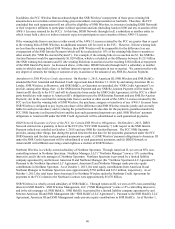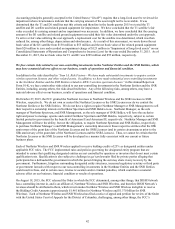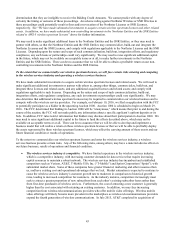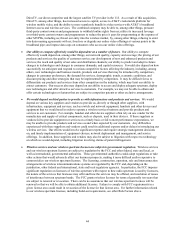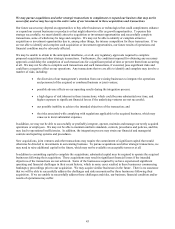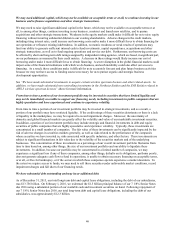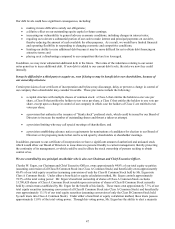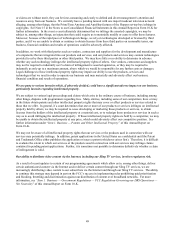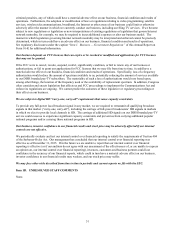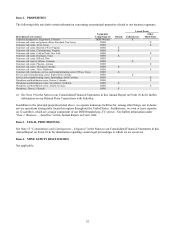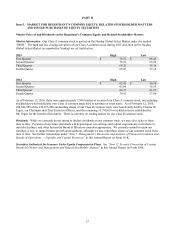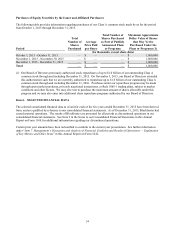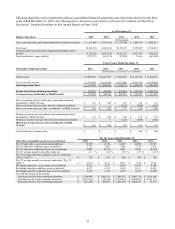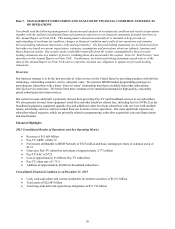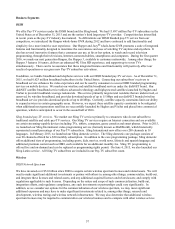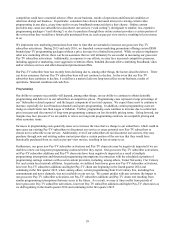Dish Network 2015 Annual Report Download - page 59
Download and view the complete annual report
Please find page 59 of the 2015 Dish Network annual report below. You can navigate through the pages in the report by either clicking on the pages listed below, or by using the keyword search tool below to find specific information within the annual report.49
or claims are without merit, they can be time-consuming and costly to defend and divert management’s attention and
resources away from our business. We currently have a pending lawsuit with one major broadcast television network
alleging, among other things, that the PrimeTime Anytime and AutoHop features of the Hopper set-top box infringe its
copyrights. See Note 15 in the Notes to our Consolidated Financial Statements in this Annual Report on Form 10-K for
further information. In the event a court ultimately determines that we infringe the asserted copyrights, we may be
subject to, among other things, an injunction that could require us to materially modify or cease to offer these features.
Moreover, because of the rapid pace of technological change, we rely on technologies developed or licensed by third
parties, and if we are unable to obtain or continue to obtain licenses from these third parties on reasonable terms, our
business, financial condition and results of operations could be adversely affected.
In addition, we work with third parties such as vendors, contractors and suppliers for the development and manufacture
of components that are integrated into our products and services, and our products and services may contain technologies
provided to us by these third parties or other third parties. We may have little or no ability to determine in advance
whether any such technology infringes the intellectual property rights of others. Our vendors, contractors and suppliers
may not be required to indemnify us if a claim of infringement is asserted against us, or they may be required to
indemnify us only up to a maximum amount, above which we would be responsible for any further costs or damages.
Legal challenges to these intellectual property rights may impair our ability to use the products, services and
technologies that we need in order to operate our business and may materially and adversely affect our business,
financial condition and results of operations.
We are party to various lawsuits which, if adversely decided, could have a significant adverse impact on our business,
particularly lawsuits regarding intellectual property.
We are subject to various legal proceedings and claims which arise in the ordinary course of business, including among
other things, disputes with programmers regarding fees. Many entities, including some of our competitors, have or may
in the future obtain patents and other intellectual property rights that may cover or affect products or services related to
those that we offer. In general, if a court determines that one or more of our products or services infringes on intellectual
property held by others, we may be required to cease developing or marketing those products or services, to obtain
licenses from the holders of the intellectual property at a material cost, or to redesign those products or services in such a
way as to avoid infringing the intellectual property. If those intellectual property rights are held by a competitor, we may
be unable to obtain the intellectual property at any price, which could adversely affect our competitive position. See
further information under “Item 1. Business — Patents and Other Intellectual Property” of this Annual Report on
Form 10-K.
We may not be aware of all intellectual property rights that our services or the products used in connection with our
services may potentially infringe. In addition, patent applications in the United States are confidential until the Patent
and Trademark Office either publishes the application or issues a patent (whichever arises first). Therefore, it is difficult
to evaluate the extent to which our services or the products used in connection with our services may infringe claims
contained in pending patent applications. Further, it is sometimes not possible to determine definitively whether a claim
of infringement is valid.
Our ability to distribute video content via the Internet, including our Sling TV services, involves regulatory risk.
As a result of recent updates to certain of our programming agreements which allow us to, among other things, deliver
certain authenticated content via the Internet and/or deliver certain content through our Sling TV services, we are
increasingly distributing video content to our subscribers via the Internet and through our Sling TV services. The ability
to continue this strategy may depend in part on the FCC’s success in implementing rules prohibiting paid prioritization
and blocking, throttling and discrimination against our distribution of content over broadband networks. For more
information, see “Item 1. Business — Government Regulations — FCC Regulations Governing our DBS Operations —
Net Neutrality” of this Annual Report on Form 10-K.



